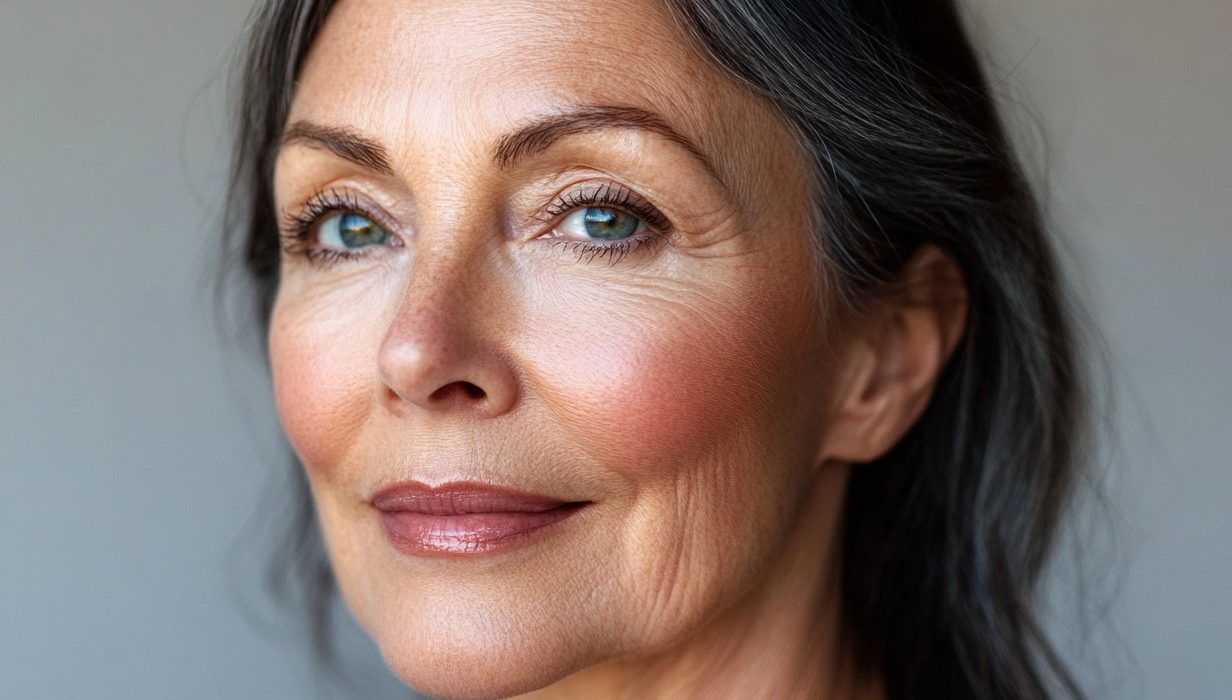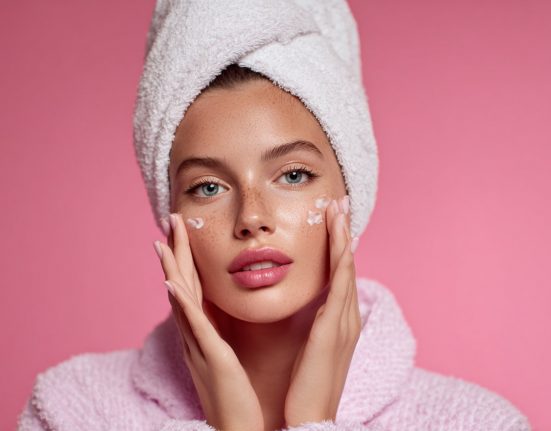A winning makeup routine is one that leaves you feeling great about yourself. And in that sense, there is no right or wrong way to do your makeup—at any age. But while age is just a number, science supports that our skin (and its appearance) changes throughout life.
For example, according to the National Institute on Aging, menopause (which may begin to happen around age 45) is marked by hormonal shifts that may lead to thinner and drier skin. Growing older also comes with an increasing loss of elastin and collagen, which can contribute to fine lines and wrinkles. The way these markers of aging skin translate to your makeup routine is ultimately a matter of personal preference. But makeup artists have some helpful tips to ensure your skin looks as amazing as possible at every stage of life.
“Skin is constantly evolving, and what worked in your 20s may not hit the same in your 40s, 50s, or beyond—and that’s totally okay,” says makeup artist Tisha Thompson, founder and CEO of LYS Beauty. “You might notice more dryness, texture, or fine lines, and that just means your routine deserves an upgrade—likely one with a greater emphasis on hydration. Sometimes it’s not about changing everything, but about prepping the skin better and reaching for products that nourish and enhance—rather than just cover up.”
Makeup artist and eyebrow specialist Stevi Christine agrees, noting that “aging and hormonal changes can mean dryer skin, sun damage, hyperpigmentation and breakouts.” In light of these shifts, she says it’s important to update “our makeup routine with something that combats and enhances these changes.”
But, how, exactly should one update their makeup routine with mature skin in mind? Below, get detailed, professional tips for exactly that purpose.
Tip 1: Prioritize Moisturizing
Skin naturally tends to become drier with age. According to the American Academy of Dermatology Association (AAD), this can happen during menopause, when the skin loses the ability to retain water as efficiently as it used to. This biological event, then, makes prioritizing makeup and skin-care products focused on hydrating and moisturizing the skin more important as we age.
“Hydration is super-important,” says Priscilla DiStasio, a celebrity makeup artist. Whether you moisturize your skin through a masking routine or regularly apply your hydrating products of choice, what’s most important is to keep your “canvas” hydrated in some way, she adds.
Thompson agrees, noting that not only does it look good to have a basis of moisturized skin, but such a foundation is also helpful for allowing your makeup to appear crisp once it’s applied. “Hydration is non-negotiable,” she says. “The more hydrated your skin is, the better your makeup wears, and the more radiant you’ll look.”
Tip 2: Consider using Skin Care with Key Active Ingredients
The AAD recommends that all people, including folks with maturing skin, apply sunscreen that’s at least SPF 30 every day before going outside. Plenty of moisturizers and foundations are formulated with SPF to make this step a breeze.
In addition to the importance of SPF, Christine says a high-quality skin-care routine targeted to your personal needs is key for helping makeup do its best work. “I know and stress the importance of a medical-grade skincare routine,” she says. “This is your skin’s armor that will ensure your foundation’s flawlessness.”
The AAD recommends opting for products with hyaluronic acid or glycerin to supercharge moisturizing products. To help remedy age-related collagen loss, which can lead to thinner skin and wrinkles, you can try out products with retinol or peptides.
Your best first stop is a visit to your dermatologist, who can help you determine the ideal active ingredients routine for you and your maturing skin.
Tip 3: Don’t Skip Primer
After you finish your skin-care routine, don’t start applying makeup to mature skin until you use a primer. Primer is crucial, designed to prep your skin to handle makeup evenly and in a long-lasting manner. “A makeup primer will help with longevity and smoothness and make application easier,” Maria I. Rincon Djuro, a KIKO Milano makeup artist, previously told InStyle. “It may contain benefits such as long-wear, oil control or hydration, color correction, and/or a blurring effect to smooth skin texture. Many primers also include skin-care benefits that help with anti-aging and promote healthier skin.”
Christine agrees, noting that this step is particularly important for folks with mature skin. “I’m a huge believer in primers for all skin types, especially mature skin,” she says. “Think of it as a shield for your tiny imperfections, so when you apply your foundation, it leaves a smooth application with the added benefit of helping your makeup last longer throughout the day.”
But do make sure your primer of choice is helpful for mature skin, in particular. “You want to find one that hydrates and smooths,” says Thompson. “Mature skin often lacks adequate moisture, so priming with a formula that plumps and softens is key to making your foundation look fresh.”
Tip 4: Prep Your Eyes
You’re going to want to pay special attention and care to prepping your eyes for makeup, because this region’s skin is naturally thin and sensitive.
“There are so many fine lines around that delicate area that can be emphasized if you’re not careful,” says Thompson. “I always recommend starting eye looks with a tacky primer that will help the shadow cling on for maximum wear.”
Tip 5: Choose Hydrating Foundation
There are all kinds of foundation formulations available, but experts recommend that people with mature skin opt for liquid or cream, which tend to be lighter weight than powders. “Cream and liquid foundations melt into the skin and give you buildable coverage without caking or emphasizing texture,” says Thompson. “Powders tend to sit on top of the skin, which can age you fast if you’re not careful.”
You can also skip formal foundation completely, instead going for a tinted moisturizer to do the trick of lightweight, hydrating coverage. Christine says the benefit here is that these products aren’t apt to settle into fine lines, but can still add a fresh glow to your complexion.
From there, you can apply your other products, which ideally will be hydrating and not drying. “Don’t shy away from cream products—they’re your best friend,” says Thompson. “Build them up slowly, in thin layers, to avoid patchiness. Cream blush and bronzer can bring life back to the face and keep everything looking soft and natural.”
Distasio also reminds that makeup is only one component of putting your best look forward; lifestyle factors also matter. “Be mindful of how important is to take care of your skin from the inside out,” she says. “It is super important to prioritize your sleep, hydration and keeping a balanced diet daily.”







